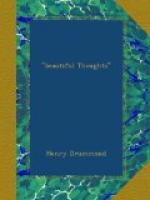April 11th. After you have been kind, after Love has stolen forth into the world and done its beautiful work, go back into the shade again and say nothing about it. The Greatest Thing in the World.
April 12th. The absence of the true Light means moral Death. The darkness of the natural world to the intellect is not all. What history testifies to is, first the partial, and then the total eclipse of virtue that always follows the abandonment of belief in a personal God. Natural Law, Death, p. 167.
April 13th. The only greatness is unselfish love. . . . There is a great difference between trying to please and giving pleasure. The Greatest Thing in the World.
April 14th. The conception of a God gives an altogether new colour to worldliness and vice. Worldliness it changes into heathenism, vice into blasphemy. The carnal mind, the mind which is turned away from God, which will not correspond with God—this is not moral only but spiritual Death. And Sin, that which separates from God, which disobeys God, which can not in that state correspond with God—this is hell. Natural Law, Death, p. 169.
April 15th. If sin is estrangement from God, this very estrangement is Death. It is a want of correspondence. If sin is selfishness, it is conducted at the expense of life. Its wages are Death—“he that loveth his life,” said Christ, “shall lose it.” Natural Law, Death, p. 170.
April 16th. Obviously if the mind turns away from one part of the environment it will only do so under some temptation to correspond with another. This temptation, at bottom, can only come from one source—the love of self. The irreligious man’s correspondences are concentrated upon himself. He worships himself. Self-gratification rather than self-denial; independence rather than submission—these are the rules of life. And this is at once the poorest and the commonest form of idolatry. Natural Law, p. 170.
April 17th. You will find . . . that the people who influence you are people who believe in you. The Greatest Thing in the World.
April 18th. The development of any organism in any direction is dependent on its environment. A living cell cut off from air will die. A seed-germ apart from moisture and an appropriate temperature will make the ground its grave for centuries. Human nature, likewise, is subject to similar conditions. It can only develop in presence of its environment. No matter what its possibilities may be, no matter what seeds of thought or virtue, what germs of genius or of art, lie latent in its breast, until the appropriate environment present itself the correspondence is denied, the development discouraged, the most splendid possibilities of life remain unrealized, and thought and virtue, genius and art, are dead. Natural Law, p. 171.




